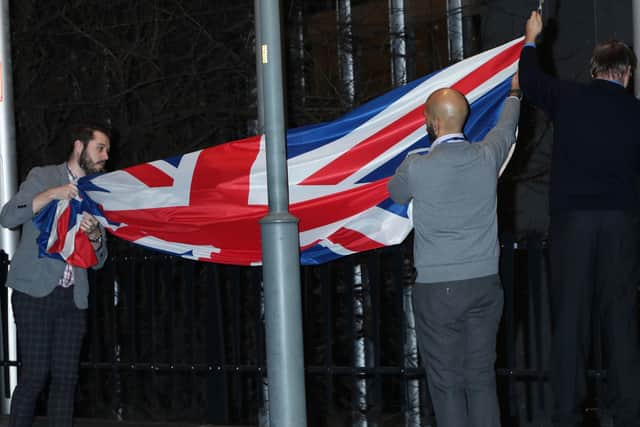Alex Kane: Why even a moderate like Dermot is right to be angry at the mess we find ourselves in


This is him from last Wednesday: ‘I am writing out of an anger, a deep anger, at not only the way Northern Ireland has been treated by Michel Barnier and his European Union colleagues, but also the lack of a coordinated and consistent response by unionist leadership ... If a moderate unionist like myself is deeply angry, I worry where that leaves other strands of unionism?’
(link to Dermot Nesbitt’s article below)
I’m not surprised by how the EU has treated the UK. Had it remained in the pressure to adopt the single currency, support the creation of an EU armed force and underwrite an EU foreign policy would have been unbearable. All empires are rooted in Topsyism and a constant imperative to ‘grow and grow’. So when a member goes rogue and leaves it was inevitable an example would be made.


Advertisement
Hide AdAdvertisement
Hide AdI don’t blame the EU for the protocol: that is the handiwork of Boris Johnson and my anger is directed at him, for it was he who cemented the foundations for what I’ve described as the constitutional granny flat which leaves NI in the EU. Nor am I surprised by the lack of a coordinated and consistent response from unionism. It was ever thus, to be honest. 1972. 1974. 1985. 1998. 2013. And again, now.
Dermot references the Council of Europe (of which the UK is a member) Framework Convention for the Protection of National Minorities (Article 21): ‘Nothing in the present framework Convention shall be interpreted as implying any right to engage in any activity or perform any act contrary to the fundamental principles of international law and in particular of the sovereign equality, territorial integrity and political independence of states.’
On a fair reading, the protocol breaches the convention. I noted in my column on February 8 my view the protocol also breached the GFA: ‘It is hereby declared that NI in its entirety remains part of the UK ...’. So, the protocol seems to breach the convention and the GFA, both of which were signed by the UK; yet that suggests the UK doesn’t think the protocol breaches either: and nor do the EU or the Republic (which also signed the GFA and convention).
The problem for unionists – as it often is – remains the UK government. It clearly doesn’t think it has breached the GFA or convention: indeed it would probably argue that since NI’s position in the UK requires a majority vote to end it – and there hasn’t been such a vote – then NI is still clearly and unambiguously in the UK. Furthermore, it seems to be arguing the protocol is the best way of securing the GFA: in other words, yes, we are being treated differently, but apparently it’s for our own good and not a breach of international law. So there.
Advertisement
Hide AdAdvertisement
Hide AdBarnier is wrong, as Dermot notes, to claim “the difficulty in the island of Ireland is caused by Brexit not by the protocol”. If France were to leave the EU its rebooted trading borders with the EU would be the existing geographical/constitutional ones. But when it comes to the Republic/EU and UK the existing border is not acceptable, because that would somehow be a breach of the GFA. But it’s ok to breach the GFA by inventing an entirely new border which separates NI from GB.
We know from arguments made since 2017 the existing border couldn’t be used because to do so might trigger violence from some republican factions. The solution: create a new border which multiplies the inconveniences and red tape for trade and irks businesses and huge numbers of people here; as well as shafting constitutional unionism in the process. But that’s ok it seems. Or as some people say, “suck it up, it’s what you voted for”.
Except it’s not what we voted for. In exactly the same way that the DUP and SF making a serial dog’s dinner of government, refusing to make collective, consensual decisions and kicking just about every can they see down the road isn’t what we voted for in the 1998 GFA referendum. Maybe voting for the GFA and Brexit were both mistakes?
Dermot does himself a disservice when he says his writing about the ‘benefit of international law,’ his private conversations with leaders of unionism, key interviewers and political commentators in the media, as well as Irish and UK governments on the subject, ‘have been a waste of time’. I hope he would agree he and I have often been heading in the same direction, albeit by different routes. But we have both, and time after time, come up against the same brick wall: what happens in NI stays in NI and the usual political rules and norms don’t apply here. Constructive ambiguity wasn’t just the cornerstone of the GFA: it has been central to politics here since the first home rule crisis in 1885.
Advertisement
Hide AdAdvertisement
Hide AdHe is aware of my pessimism. He is aware, too, the structures of unionism make coherent, collective positioning difficult. He’ll remember the battles within the UUP in 1973/4 and 1997/2005. He is right, though, about the need for a coordinated consistent response by unionists now (maybe at that point they’d take seriously his points re international law).
It’s why I support a standing council/committee representing the entire range of voices and vehicles supporting the Union.
My sense, sadly, is that mine is a minority view.
• Dermot Nesbitt: It beggars belief that unionists say nothing about how the NI Protocol breaches international law
——— ———
A message from the Editor:
Thank you for reading this story on our website. While I have your attention, I also have an important request to make of you.
Advertisement
Hide AdAdvertisement
Hide AdWith the coronavirus lockdown having a major impact on many of our advertisers — and consequently the revenue we receive — we are more reliant than ever on you taking out a digital subscription.
Subscribe to newsletter.co.uk and enjoy unlimited access to the best Northern Ireland and UK news and information online and on our app. With a digital subscription, you can read more than 5 articles, see fewer ads, enjoy faster load times, and get access to exclusive newsletters and content. Visit https://www.newsletter.co.uk/subscriptions now to sign up.
Our journalism costs money and we rely on advertising, print and digital revenues to help to support them. By supporting us, we are able to support you in providing trusted, fact-checked content for this website.
Alistair Bushe
Editor